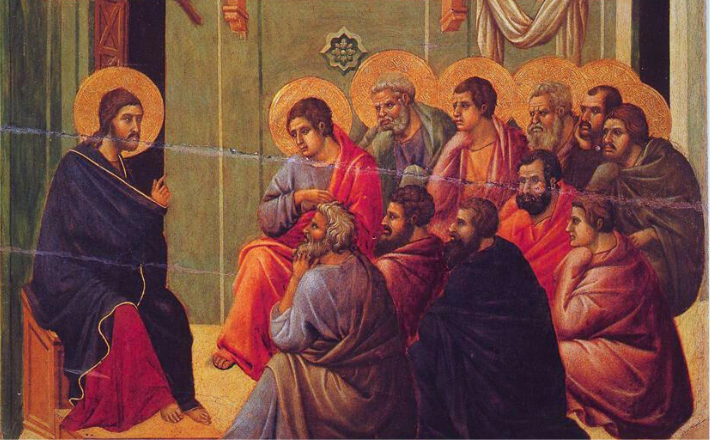Commentary on John 17:6-19
The power and necessity of intercessory prayer immediately sprang to mind when I read John 17:6–19. Not only is intercession an expression of agapeic love. It is also effectual when fervently offered by a righteous one, as James 5:16 asserts. And so, my heart is flooded with gratitude that Jesus, God’s righteous servant, loves us so much that he interceded on our behalf, even when death loomed large before him.
Bookended by Jesus and his disciples’ final dinner and foot-washing ritual in chapter 13 and his arrest in chapter 18, chapter 17 culminates a rather lengthy preparatory discourse on post-resurrection discipleship. Having identified his disciples as co-sharers with him in chapter 13, Jesus reveals his impending death and issues a new commandment, preparing them to embrace his ministerial vision as their own and commit themselves to bringing that vision to fruition (33–34).
The chapters that follow (14–16) reveal Jesus’ multilayered preparatory approach. In chapter 14, Jesus assures his disciples that he is going to “prepare a place” for them and will return someday to take them to his “Father’s house,” a grand edifice with accommodations enough for all (verses 1–14). And lest they grow weary of waiting or fall prey to fear, Jesus promises to send them “another Advocate” (Greek paráklētos), “the Spirit of truth” who will forever aid and sustain those who love him by keeping his commandments (verses 15–31).
In chapter 15, Jesus encourages his disciples to abide or remain (Greek menōs) in him as he abides in us. For he is the “true vine,” the source from which we gain the sustenance necessary to bear much fruit to the glory of God—that is, to keep God’s commandments as revealed in Jesus, and to love one another (verses 1–17). Jesus also forewarns his disciples that the world’s powers and principalities (Greek kósmos), whose ideologies and mores are inimical to his ministerial vision, will persecute them because of the power of his name and the countercultural timbre of his vision (verses 18–25). The journey, in other words, will be perilous.
With the goal of shoring the disciples up so they “will not fall away,” chapter 16 reiterates several themes from the preceding chapters: the difficulty of the journey (verses 1–3), Jesus’ impending departure (verses 4–6), the Advocate’s role in prosecuting the world (verses 7–11), and the joy that awaits them (verses 16–27; see also 15:11). Hearing this, the disciples finally believe that Jesus came from God (verses 29–30). But Jesus knows what they cannot yet perceive: that the next few days will threaten their security, safety, prosperity, and overall well-being (Greek eirḗnē = peace) as never before (verses 31–33).
After such weighty words of encouragement, assurance, and love, Jesus “looks toward heaven” and prays (chapter 17). The Revised Common Lectionary omits verses 1–4, but wisdom suggests holding them in mind to contextualize the chapter. Also consider including verses 20–21, as they extend Jesus’ intercession into the present.
The first four verses in chapter 17 reveal Jesus’ personal petition as he anticipates the end of his ministerial journey. This is important because, though images of Jesus’ crucifixion may have dissipated for many today, Jesus is unambiguously aware that “his hour has come.” Jesus approaches that hour, confident that he has extended eternal life to all whom God has given him and that he has glorified or made known God’s presence (doxázō) “by finishing the work [God] gave [him] to do” (17:4).
Two ideas are worth further investigation. The first is John’s use of the word “glory” or some derivative thereof. “Glorification,” explain Gail O’Day and Susan Hylen, “is John’s way of describing the revelation of God’s love that takes place in Jesus’ death, resurrection, and ascension. By glorifying God, Jesus makes visible the presence of God; thus Jesus’ glorification also glorifies God.”1 To glorify God or to glorify God in Jesus Christ is to make known in word and deed God’s vision for the world.
The second idea is the Gospel of John’s understanding of “eternal life.” In John’s Gospel, eternal life is not about immortality or the afterlife. Rather, it is how John speaks about the kingdom of God, a God-infused reality taking shape in the present.2 Verse 3 makes this point explicit when Jesus asserts that eternal life encompasses knowing the only true God as revealed in his life and ministry. And what was his ministry? To make God’s name known to those whom God gave him, to all who endeavor to live in accordance with God’s word (17:6–7).
The intercessory portion of the prayer begins in verse 6. Jesus has made God’s name known to those who believe and has given them God’s words. They are eyewitnesses to Jesus’ ministry; to how he taught, advocated, and demonstrated what it means to make evident God’s presence in the earth. And now they know (Greek ginṓskō) that Jesus embodies divine truth. Yet they do not know what it means to take up Jesus’ ministerial vision and bear such truth as their own—a vision that will place them at odds with the powers and principalities of their day. So Jesus fervently prays that God will protect, delight, secure, and sanctify them.
Jesus is more explicit about the subjects of his prayer than may be comfortable for some. He specifically prays for “those whom [God] gave [him] from the world” (16:6). He is equally explicit that he is “not asking on behalf of the world” (16:9). Uncomfortable, yes. But wisdom counsels us to resist drawing too sharp a dichotomy between “the world” and Jesus’ disciples, especially as regards God’s love. As John 3:16 reminds us that God loves the entire “world.”
In John 17, Jesus intercedes for those who know him because their proclamation and practice will very often negate the ruling social and religious ideologies and mores of the day. In this respect, “the world” (Greek kósmos) refers to principalities and powers, whether civil, religious, or socio-cultural, that promote and propagate division, hatred, discord, or other attitudes and practices that are inimical to Jesus’ ministerial vision.
In verses 14–16, Jesus intensifies his prayer, noting that the world will hate those who propagate God’s word because they “do not belong to“ (New Revised Standard Version Updated Edition) or “are not of the world” (King James Version). The Greek preposition “ek” denotes a point of origin or point from whence something proceeds. Those who have come to know Jesus are not “of” the world because their worldview or view of what can and ought to be originates from Jesus’ vision of a world in which love reigns supreme.
Therefore, Jesus appeals on behalf of those through whom he has been glorified, commending them to God’s care as his ministerial journey ends (verses 9–10). Jesus views himself as no longer in the world; his journey is complete. But his disciples are in the world, and upon their shoulders lies the future of Jesus’ ministerial vision (verse 11a). So Jesus commends them to God’s care (verses 11b–12).
Jesus’ intercession includes four interrelated requests. First, he asks God to protect them from fragmentation so that they will remain one in heart, purpose, and intent (verse 11b); and that they will come to know themselves as one body, one communion, one fellowship despite their many differences, nullifying the impulse toward division and discord.
Second, he prays that the joy (Greek chará) he has known will be made complete or full (Greek plēróō) in those who know him (17:13; see also 15:11). He desires that they will experience such delight and joy in doing the work of the ministry that it fills every hollow space, so that worldly enticements will no longer hold sway over them.
Then, in 17:15 Jesus asks God to “protect them from the evil one” (New Revised Standard Version Updated Edition or “keep them from the evil” (King James Version). I concur with O’Day and Hylen, who say, “Much like the ‘ruler of this world’ … the evil one is the embodiment of all that is opposed to God.”3 This idea aligns with the perspective that eternal life entails knowing God as revealed in Jesus Christ (17:3). Jesus is asking God to protect his disciples from all that opposes God.
Finally, Jesus prays, “Sanctify them in the truth; your word is truth” (17:17). Reiterating verse 8, Jesus asks God to set them apart (Greek hagiázō) for the work of the ministry, to embolden and empower them to bear witness to the word of truth they have received even as the world seeks to negate and inhibit their proclamation and practices of faith. For Jesus himself was set apart, or sanctified, for this ministry.
Those of us who know Jesus today can take solace in verses 20–21, as they remind us that Jesus’ prayer extends into the present moment. We are recipients of those first disciples’ testimony. We also endeavor to keep Jesus’ ministerial vision alive. Therefore, we can take comfort in knowing that Jesus’ intercessory prayer from long ago remains effectual for our lives today.
Notes
- Gail O’Day and Susan Hylen, John (Louisville: Westminster John Knox, 2006), 162. Emphasis added.
- See also O’Day and Hylen. John, 45.
- O’Day and Hylen, John, 164.


May 12, 2024